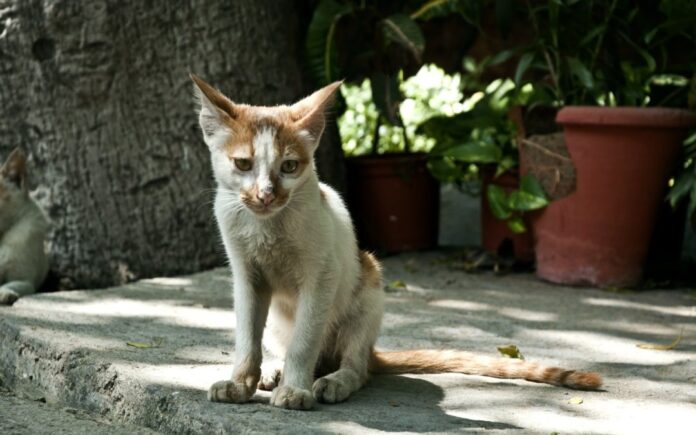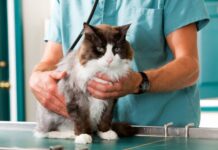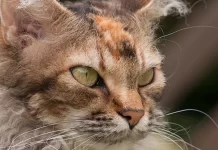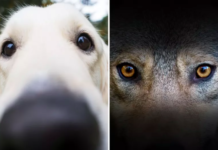Is your cat losing weight? Weight loss that is unintended is generally a symptom of an underlying health issue. Many owners believe that weight reduction in elderly cats is typical, however, this is not true. If your cat’s weight loss is unexplainable, it’s important that you intervene quickly.
How to Tell if Your Cat Is Losing Weight
When your cat loses weight gradually, it’s difficult to determine whether he’s actually dropping weight. It may be difficult to detect whether your cat has lost weight if he or she has a lot of furs or was previously somewhat overweight.
Start by examining your cat’s body from above to evaluate his or her health. At a healthy weight, there should be a visible but not excessive tuck in the waist. After that, rub your hands down the sides of your cat. The ribs should be perceptible and covered in a thin layer of fat. If your cat’s ribs are pronounced and noticeable, he or she is probably underweight.

What Causes Weight Loss in Cats?
Cats often lose weight when they do not eat enough. Despite sufficient food consumption, certain illnesses induce weight loss. Weight loss may or may not be accompanied by other symptoms of disease, depending on the reason. Weight loss in cats may be caused by a variety of health issues, some of which are more severe than others.
Hyperthyroidism
Hyperthyroidism is a very frequent condition that mostly affects elderly cats. Due to an expansion of the thyroid gland, cats with hyperthyroidism generate too much thyroid hormone. The most common cause of thyroid enlargement is a benign tumour that develops on the thyroid.
Weight loss, increased hunger, and increased thirst and urination are all common symptoms of hyperthyroidism. Vomiting, diarrhoea, and hyperactivity are also common in cats. Some cats may scream and appear agitated. The coats of cats with hyperthyroidism may look untidy and oily. Radioactive iodine or oral medicines are used to treat hyperthyroidism.

Chronic Kidney Disease (CKD)
One of the most frequent diseases in elderly cats is chronic kidney disease. The kidneys are responsible for the synthesis of essential hormones, the filtering of waste from the blood, the regulation of blood pressure, and the creation of new red blood cells. When a cat’s kidneys cease working correctly, it may cause plenty of additional problems.
When a cat has renal problems, the initial symptoms are increased thirst and urine, followed by lack of appetite, weight loss, and lethargy.
Chronic kidney disease is not curable, although it may frequently be treated medically with medication, a change in diet, and fluid supplementation.
Diabetes
Another frequent disease that affects cats is diabetes mellitus. The capacity of the pancreas to generate insulin, a hormone necessary for blood glucose regulation, is impaired by this endocrine disease.
Weight loss, increased hunger, thirst, and urination, as well as tiredness, are all symptoms of diabetes.
Insulin and a change in diet are usually used to treat diabetes. Other medicines may be utilised as well. After a few months of therapy, some cats may even return to normal.

Gastrointestinal Problems
Any problem with the gastrointestinal system may influence a cat’s weight. For starters, gastrointestinal issues may cause a loss of appetite. Second, certain problems with the GI tract hinder it from effectively digesting food and absorbing nutrients, resulting in weight loss. Intestinal parasites, inflammatory bowel disease, pancreatitis, and other pancreatic disorders, as well as GI malignancies, are all common GI concerns in cats.
Loss of appetite, weight loss, vomiting, diarrhoea, tiredness, and other symptoms of GI problems may occur. Deworming the cat may be enough to treat GI parasites. Other gastrointestinal problems usually require medicine and supportive treatment.
Dental Problems
Oral and dental problems may cause excruciating pain, as well as a decrease in appetite and weight loss. Periodontal disease, resorptive lesions, and tooth fractures are all common dental issues in cats. 5 Stomatitis, a painful inflammation of a cat’s mouth and gums that may be immune-mediated, affects certain cats.
Bad breath, drooling, pawing at the mouth, and even oral bleeding are all signs of dental problems.
The first stage in treatment is for your cat’s veterinarian to sedate him and provide professional dental cleaning, evaluation, and treatment if needed. Oral surgery and/or tooth extraction may be required in certain cats.

Cancer
Cats, like humans, may develop cancer anyplace in their bodies. Cancer may take the shape of a tumour or it can’t. Lymphoma is one of the most frequent malignancies in cats, and it may take up residence in the gastrointestinal tract, mouth, lymphatic system, and other areas. General malaise, tiredness, discomfort, muscle atrophy, appetite loss, and overall weight loss are all symptoms of cancer.
Stress
Cats are very sensitive to changes in their environment. They may suffer more severe symptoms later on as a result of their ability to hide outward indications of stress. Any stresses in the surroundings may cause anxiety and tension in your cat. Stress causes a decrease in appetite, which ultimately leads to weight loss.
Weight loss may also be caused by a variety of other health problems. You may or may not notice additional symptoms of sickness if your cat has an underlying health problem. Furthermore, since many illnesses have identical symptoms, a veterinarian is required for diagnosis.
Weight Loss Treatment for Cats
Weight loss in cats is treated differently depending on the reason. If you realise your cat is losing weight, the first thing you should do is make an appointment with your veterinarian. Your veterinarian will do a physical examination first. To identify the issue, lab tests and/or x-rays may be required. Your veterinarian may prescribe medicine, a change in food, surgery, or other treatments based on the results.
If your cat’s health is normal, the weight loss may be due to insufficient food consumption or an undiagnosed or undetected illness. Inquire with your veterinarian about nutrition and environmental enrichment options. If you can pinpoint a cause of worry for your cat, take steps to alleviate it. Your veterinarian may also suggest a nutrient- and calorie-balanced diet that might aid in your cat’s weight growth.
If your cat’s weight loss persists despite your efforts, schedule an appointment with your veterinarian. For advanced diagnostics, your veterinarian may send you to a veterinary expert.

How to Keep Cats From Losing Weight
Regularly monitoring your cat’s physical health and visiting the doctor for wellness checks may help avoid weight loss. Cats are masters at concealing sickness and injuries, but your veterinarian may be able to see a problem before it becomes serious. Any changes in your cat’s behaviour should be immediately reported to your veterinarian. It’s far simpler to address a health issue while it’s still early on rather than waiting until your cat is very sick.


















